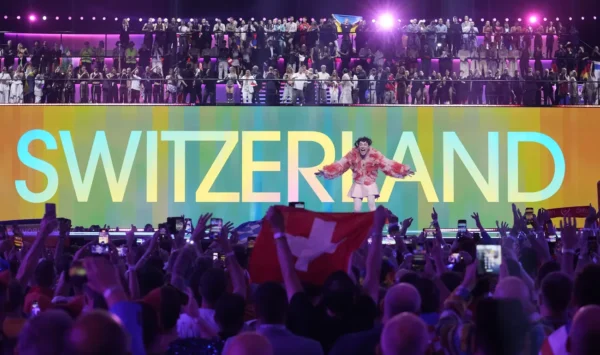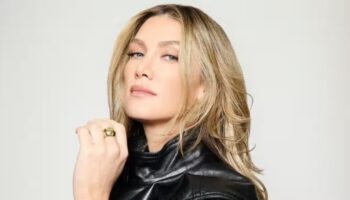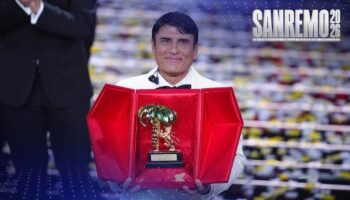As the calendar brings us into the 2025 Eurovision season and Eurofans are already making their travel plans to the Swiss city of Basel, it is time to have a closer look at the legacy of next year’s host Switzerland in our beloved contest. Here is a list of some of the most prominent Swiss names in the history of Eurovision.
Switzerland is one of the founding members of the Eurovision Song Contest and has partaken a total of 64 times since 1956. The alpine country has won the contest three times: in 1956, 1988 and of course in 2024. While the contest enters its Swiss season the legacy of the country goes well beyond its presence on stage.
Marcel Bezençon
How could we not start this list without naming the idealist of the Eurovision Song Contest. Swiss journalist Marcel Bezençon was born in Orbe, Switzerland in 1907 and was the man behind the idea of a European Song Contest, modelled on the already existing Italian Festival of Sanremo.
After presenting the idea at the general assembly of the European Broadcasting Union in 1955, the first edition of the Eurovision Song Contest saw the light in Lugano, in the Italian-speaking part of Switzerland, on 24 May 1956. Marcel Bezençon was at the time director of Radio-Lausanne and also of SSR, the Swiss Broadcasting Corporation.
Since 2002 the Marcel Bezençon Awards honour the best competing songs in the final of the Eurovision Song Contest. They are divided into the Press Award, the Artistic Award and the Composer Award.
Marcel Bezençon died in 1981 in Lausanne, a few years before the city hosted his own creation.
Lys Assia
The Grande Dame of the Eurovision Song Contest, Lys Assia is in the hearts and minds of every Eurofan for being the first Eurovision winner back in 1956. Aged 32 she was selected to represent her home country at the new-born contest in Lugano with two entries: Refrain (in French) and Das alte Karussell (in German). Refrain, co-written by Emile Gardaz and Géo Voumard, will place first at the end of the show, making Lys Assia the first historical winner.
Ms Assia went on to represent Switzerland again in 1957 with L’enfant que j’étais, placing 8th, and for a third consecutive time in 1958 with Giorgio finishing runner-up with 24 points, only three points behind France’s Dors mon amour of André Claveau.
Lys Assia attempted to go back to the Eurovision stage again in 2011 when she participated in the Swiss national selection with the emotional song C’était ma vie, placing 8th. The following year she submitted the entry All in your head, without however being selected for the final.
Lys Assia died on 24 March 2018 in Zurich, as reported by ESCtoday.
https://www.youtube.com/watch?v=1HKSP_HQ5hk
Frank Naef
Frank Naef is one of the longest-serving Eurovision Executive Supervisors, having occupied the role between 1978 and 1992. He is notably famous in the history books for being the scrutineer during the 1991 voting drama in Rome, when Sweden and France tied for first place with 146 points. According to the rules Mr Naef proceeded to verify which country had received the highest number of twelve points (four times each), then the highest number of 10 points (5 for Sweden and 2 for France). After minutes of confusion Mr Naef proclaimed Sweden’s own Carola winner of the 36th Eurovision Song Contest.
Under Frank Naef’s reign the Eurovision Song Contest saw the introduction of age restrictions for participating artists. Since 1990 all artists must be at least 16 years of age the day of the final. This new rule was introduced after two children of 11 and 12 year-old took part to the 1989 Eurovision Song Contest in Lausanne, representing France and Israel respectively. This change meant that 1986 winner Sandra Kim, 13 the day of the final, will probably forever stay as the youngest ever Eurovision trophy holder.
Eurovision.tv has published in 2016 an interview with Mr Naef in which he recalls his best memories from the contest.
Peter, Sue and Marc
Peter Reber, Sue Schell and Marc Dietrich are a Swiss music trio from Bern. They have represented Switzerland four times, in 1971, 1976, 1979 and 1981. They are tied in first place with Valentina Monetta from San Marino and Fud Leclerc from Belgium for the highest amount of participations in the Eurovision Song Contest. The trio has however one astonishing feature: they have performed four times in four different languages. In 1971 they presented Les illusions de nos vingt ans in French, in 1976 Djambo Djambo in English, in 1979 Trödler und Co in German and finally Io senza te in Italian in 1981.
Their success in Eurovision remained mixed, having placed 12th, 4th, 10th and again 4th in their four appearances. Furthermore, they have taken part to the Swiss national selection to Eurovision 6 additional times between 1973 and 1983, making them the one the most prominent Swiss bands of the 1970s and 1980s.
Céline Dion
Céline, dear Céline. How could we not go through the participation of Switzerland in the contest without naming one of the leading names of the world music industry of the last 40 years. Still largely unknown in Europe in 1988, a young girl of only 20 years of age is selected to represent Switzerland at the 33rd Eurovision Song Contest held in Dublin, Ireland.
The Canadian singer sang Ne partez pas sans moi, co-written by Nella Martinetti and Atilla Sereftug in position number nine of the running order. At the end of a nerve-wrecking voting sequence Switzerland was declared winner over the United Kingdom by only one point, 137 to 136. British representative Scott Fitzgerald had long led in the scoreboard with his entry Go, but was defeated when the last voting jury from Yugoslavia did not award any points to the United Kingdom, leaving Céline Dion in first place.
Ne partez pas sans moi rapidly became an international hit and served as trampoline for an incredible world-wide career.
https://www.youtube.com/watch?v=VXLWfXmlXPc
Nemo
Nemo Mettler is the winner of the 68th Eurovision Song Contest, which took place in Malmö, Sweden in May 2024. The 24 year-old singer from Biel/Bienne became the third winner from Switzerland and the first ever non-binary winner in the history of the contest.
Nemo was internally selected to represent their home country with the entry The code. With their performance Nemo overwhelmingly won the jury vote with 365 points and was able to retain the first position thanks to 226 televote points. The code received a total of 591 points, which represents the fourth highest score ever awarded in the history of the Eurovision Song Contest.
https://www.youtube.com/watch?v=CO_qJf-nW0k
Photo credit: Keystone/Martin Meissner



